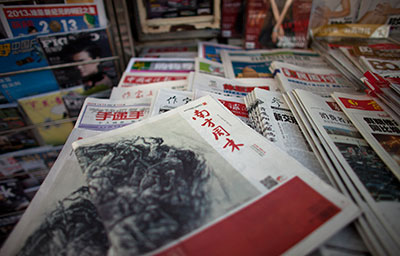Staffers at the Guangdong-based Southern Weekly magazine have publicly expressed their outrage at the heavy handed intervention of propaganda officials who unilaterally rewrote a New Year’s editorial calling for improved constitutional rule in China. A piece extolling the virtues of the Communist Party ran in its place. Sixty staffers posted an open letter to the provincial government accusing propaganda officials of “raping” the paper’s editorial procedures, The Associated Press reports. Apparently, the editorial was changed by censors after the magazine had closed and was being readied for the printer. Staff did not know of the changes until the piece appeared in print and online.
“We demand an investigation into the incident, which has seen proper editorial procedure severely violated,” the open letter said, according to a translation on the independent English-language website Shanghaiist. AP says another 35 former reporters from the newspaper called for the resignation of the provincial party propaganda chief Tuo Zhen, whom they held personally responsible for the changes. Staffers also took their case to Sina Weibo, China’s mashup of Twitter and Facebook platforms.
You might be surprised that journalists in China would stand up to the government like this, given all that we have been reporting for years on media restrictions and the jailing of journalists. But Southern Weekly and its sister newspaper Southern Daily, based in the economic hothouse of Guangdong province that borders Hong Kong, have long been one of several vocal and independent-minded Chinese media. In fact, as Kristin Jones pointed out about a year ago in a CPJ blog post, “When it comes to having impact–shifting policies, changing local laws, and even provoking the arrests of party-connected criminals–the media in China have shown their power repeatedly.”
Which is not to say that media criticism of the Chinese government results in widespread reform. The government maintains active propaganda departments at the national, provincial, and local levels to head off what censors might consider unacceptable. Calls for democracy and ending the hegemony of the Communist Party; criticism of the military; mention of the Tiananmen demonstrations and the ensuing deadly crackdown; or discussion of religious groups like Falun Gong are all clearly taboo. But after that, the restrictions can vary from day to day and region to region. Editors and reporters push the envelope daily, but usually not enough to get anyone arrested. Too many violations can get editors or reporters fired or demoted.
To complicate matters, enter the official English-language response to the Southern Weekly staff’s anger. An editorial in the Communist Party-run Global Times, “Time to reflect on old media management,” says:
The reality is that old media regulatory policies cannot go on as they are now. The society is progressing, and the management should evolve. Traditional media is integrating intimately with new media in China, resulting in frequent migration of professionals and different ways for them to pursue their personal interests. All these means the traditional regulation mechanisms no longer fit the new environment.
Tellingly, the paper did not call for an abolition of “regulation mechanisms.” What’s really needed, the paper says, is only the updating of the censorship regime to fit China’s new media environment. It’s the sort of dodge–taking on apparently controversial topics in official media in English for the benefit of foreign readers –that CPJ Senior Researcher Madeline Earp addressed as far back as June 2009, when the paper actually mentioned the Tiananmen demonstrations and their bloody aftermath in a piece called “Evolution of Chinese intellectuals’ thought over two decades.” Earp’s blog post debunked the idea that the Global Times did anything other than damage control.
As for that “new media environment” Global Times mentions? The University of Hong Kong’s China Media Project is tracking both popular and official responses to the Southern Weekly incident in “A New Year’s greeting gets the axe in China” as the story continues to unfold. The site also has a translation of the original editorial and the one that eventually appeared.
